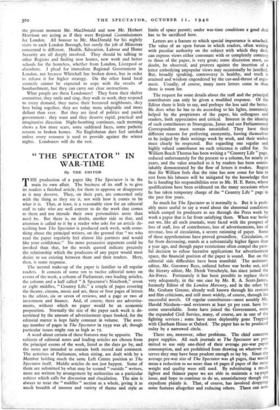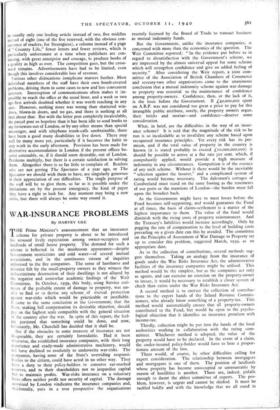" THE SPECTATOR " IN WAR-TIME
By THE EDITOR
THE production of a paper like The Spectator is in the main its own affair. The business of its staff is to give its readers a finished article, for them to approve or disapprove as it may deserve. They, on their part, are concerned only with the thing as they see it, not with how it comes to be what it is. That, at least, is a reasonable view for an editorial staff to take who are well content to do the work that comes to them and not intrude their own personalities more than need be. But there is, no doubt, another side to that, and attention is called to it by a reader who asks for an article de- scribing how The Spectator is produced each week, with some- thing about the principal writers, on the ground that " we who read the paper regularly feel almost like partners and would like your confidence." No more persuasive argument could be invoked than that, for the words quoted indicate precisely the relationship which the producers of any paper would most desire to see existing between them and their readers. Here, then, is some response.
The normal make-up of the paper is familiar to all regular readers. It consists of some ten to twelve editorial notes on events of the week, a column of Parliament, two leading articles, the column and a half called " A Spectator's Notebook," seven or eight middles, " Country Life," a couple of pages covering the theatre, cinema, music and art, three or four pages of letters to the editor, six or seven of reviews, and a page or two of investment and finance. And, of course, there are advertise- ments, without which no paper would be an economic proposition. Normally the size of the paper each week is de- termined by the amount of advertisement space booked, for the editorial matter is kept fairly constant in volume. The aver- age number of pages in The Spectator in 1939 was 48, though particular issues might run as high as 72.
A word about certain of these features may be apposite. The subjects of editorial notes and leading articles are chosen from the principal events of the week, listed as the days go by, and the notes are intended to contain both record and comment. The activities of Parliament, when sitting, are dealt with by a Member holding much the same Left Centre position as The Spectator itself. Middle articles do not just happen. Some of them are submitted by what may be termed " outside " writers, more are written by arrangement by authorities on a particular subject which calls for discussion and elucidation. The aim is always to treat the " middles " section as a whole, giving it as much breadth of interest and variety of theme and style as limits of space permit; under war-time conditions a good deal has to be sacrificed here.
Letters are a feature to which special importance is attached. The value of an open forum in which readers, often writing with peculiar authority on the subject with which they deal, can express views either consonant with or completely contrary to those of the paper, is very great; some discretion must, no doubt, be observed, and protests against the insertion of a letter embodying unpopular views may occasionally be justified. But, broadly speaking, controversy is healthy, and truth is attained and wisdom engendered by the cut-and-thrust of argu- ment. Usually, of course, many more letters come in than there is room for.
The request for some details about the staff and the principal contributors can only be given a modified response. Of the Editor there is little to say, and perhaps the less said the better. He does what he has to do according to his lights, immensely helped by the proprietors of the paper, his colleagues and readers, both appreciative and critical. Interest in the identity of such contributors as Strategicus, Janus and our Parliamentary Correspondent must remain unsatisfied. They have their different reasons for preferring anonymity, leaving themselves to be judged by their writings week by week, and their wishes must clearly be respected. But regarding one regular and highly valued contributor no such reticence is called for. Sir William Beach Thomas has been writing a "Country Life " page, reduced unfortunately for the present to a column, for nearly 20 years, and the value attached to it by readers has been unmis- takably demonstrated by the flow of letters it evokes. Regret that Sir William feels that the time has now come for him to rest from his labours will be mitigated by the knowledge that he is handing his responsibilities over to Mr. H. E. Bates, whose qualifications have been evidenced on the many occasions when he has taken temporary charge of the " Country Life " page in the past few years.
So much for The Spectator as it normally is. But it is prob- ably more useful to say a word about the abnormal conditions which compel its producers to see through the Press week by week a paper that is far from satisfying them. When war broke out we, like all such journals, were faced with the prospect of loss of staff, loss of contributors, loss of advertisements, loss of revenue, loss of circulation, a severe rationing of paper. Some of these apprehensions have proved groundless. Circulation, so far from decreasing, stands at a substantially higher figure than a year ago, and though paper restrictions often compel the pain- ful decision to refuse lucrative applications for advertisement space, the financial position of the paper is sound. But on the editorial side difficulties have been manifold. The assistant- editor, Mr. Goronwy Rees, enlisted before war broke out, and the literary editor, Mr. Derek Verschoyle, has since joined the Air-Force. Fortunately it has been possible to replace them very adequately, in the one case by Mr. R. A. Scott-James, formerly Editor of the London Mercury, and in the other by Mr. Graham Greene, already well known through his reviews and film criticisms, and still more widely, of course, through his successful novels. Of regular contributors—most notably Mr. Harold Nicolson—and reviewers at least 50 per cent. have be- come unavailable. Some have joined the Government, some the expanded Civil Service, many, of course, are in one of the fighting services ; some have most deplorably gone Trappist with Chatham House at Oxford. The paper has to be produced today by a narrowed circle.
There are, moreover, other problems. The chief concerns paper supplies. All such journals as The Spectator are per- mitted to use only one-third of their average pre-war paper consumption, and are prohibited from drawing on whatever re- serves they may have been prudent enough to lay by. Since the average pre-war size of The Spectator was 48 pages, that would mean a reduction to no more than 16 pages if paper of the same weight and quality were still used. By substituting a much lighter and thinner paper we are able to maintain a 24-Page issue, and hope to continue to do so, unsatisfactory though the expedient plainly is. That, of course, has involved dropping some features altogether and reducing others. There can now be usually only one leading article instead of two, five middles instead of eight (one of the five reserved, with the obvious con- currence of readers, for Strategicus), a column instead of a page of " Country Life," fewer letters and fewer reviews, which is particularly unfortunate at a time when publishers are con- tinuing, with great enterprise and courage, to produce books of a quality as high as ever. The competition goes, but the cross- word remains. Advertisements have had to be limited, even though this involves considerable loss of revenue.
Various other dislocations Complicate matters further. Most individual members of the staff have their own bomb-created problems, driving them in some cases to new and less convenient quarters. Interruption of communications often makes it im- possible to reach the office at the usual hour, and a week or two ago first arrivals doubted whether it was worth reaching in any case. However, nothing more was wrong than shattered win- dows, blown-in doors, and no gas, and there is nothing at all fatal about that. But with the letter post completely incalculable, the parcel post so hopeless than it has been idle to send books to any reviewers out of London, or by any other means than special messenger, and with telephone trunk-calls unobtainable, there have been a good many disabilities to live down. There may well be many more yet, particularly if it becomes the habit to stop work in the early afternoon. Provision has been made for alternative accommodation in London if the present offices be- come untenable, or, if it should seem desirable, out of London. Problems multiply, but there is a certain satisfaction in solving them. Altogether there is so far little to complain of. Readers who are not getting The Spectator of a year ago, or The Spectator we should wish them to have, are singularly generous in their appreciation of our difficulties. The single purpose of the staff will be to give them, so far as is possible under the limitations set by the present emergency, the kind of paper they have a right to look for. Any moment may bring a new crisis, but there will always be some way round it.



























 Previous page
Previous page